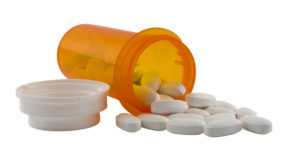 Antibiotics can be life-saving, but there are also unintended consequences. One of them is that they disrupt and alter the gut microbiome (the microbial community of the millions of microbes living in the intestines). A large study found that use of antibiotics is linked to a higher risk of colon cancer 5 to 10 years later.
Antibiotics can be life-saving, but there are also unintended consequences. One of them is that they disrupt and alter the gut microbiome (the microbial community of the millions of microbes living in the intestines). A large study found that use of antibiotics is linked to a higher risk of colon cancer 5 to 10 years later.
The researchers thought this was due to the antibiotics having negative effects on the gut microbiome. Antibiotics reduce numbers of beneficial bacteria in the intestines, while allowing bacteria linked to colorectal cancer to increase.
Researchers at Unea Univ. in Sweden compared 40,545 colon cancer cases to 202,720 controls (no cancer), and found that as antibiotic use increased, colon cancer increased in those persons during the next 10 years. It is unknown what happens after 10 years, because that is when the study ended. Interestingly, in women - increased use of antibiotics was linked to a lower incidence of rectal cancer.
The researchers analyzed the results with respect to different classes of antibiotics, and found the strongest association with the use of quinolones, sulfonamides, and trimethoprims. These antibiotics have an effect on bacterial diversity - specifically allowing anaerobic Fusobacteria and Bacteroidetes species to live and become more abundant. Other studies also support the view that Fusobacteria (e.g., Fusobacterium nucleatum) and Bacteroidetes species contribute to colorectal cancer development.
What to do? To increase beneficial species in the gut and lower levels of inflammation in the body, studies support eating a diet rich in fruits, vegetables, whole grains, nuts, seeds, legumes, and fish - which also results in a high fiber intake (e.g., Mediterranean diet). Also, to quickly improve the diversity of microbes in the gut (a sign of health!) and to lower inflammation in the body, increase your intake of fermented foods.
 Fermented foods include: yogurt, buttermilk, sour cream, cheese, kefir, fermented vegetables, kimchi, natto, miso, sauerkraut, traditional pickles, traditional sourdough bread, apple cider vinegar, and kombucha. To quickly improve the gut microbiome, try to eat six 1/2 cup servings each day for a few months.
Fermented foods include: yogurt, buttermilk, sour cream, cheese, kefir, fermented vegetables, kimchi, natto, miso, sauerkraut, traditional pickles, traditional sourdough bread, apple cider vinegar, and kombucha. To quickly improve the gut microbiome, try to eat six 1/2 cup servings each day for a few months.
From Science Daily: Antibiotics linked to increased risk of colon cancer
There is a clear link between taking antibiotics and an increased risk of developing colon cancer within the next five to ten years. This has been confirmed by researchers at Umeå University, Sweden, after a study of 40,000 cancer cases. The impact of antibiotics on the intestinal microbiome is thought to lie behind the increased risk of cancer.
Researchers found that both women and men who took antibiotics for over six months ran a 17 per cent greater risk of developing cancer in the ascending colon, the first part of the colon to be reached by food after the small intestine, than those who were not prescribed any antibiotics. However, no increased risk was found for cancer in the descending colon. Nor was there an increased risk of rectal cancer in men taking antibiotics, while women taking antibiotics had a slightly reduced incidence of rectal cancer.
The increased risk of colon cancer was visible already five to ten years after taking antibiotics. Although the increase in risk was greatest for those taking most antibiotics, it was also possible to observe an admittedly small, but statistically significant, increase in the risk of cancer after a single course of antibiotics.
The present study uses data on 40,000 patients from the Swedish Colorectal Cancer Registry from the period 2010-2016. These have been compared to a matched control group of 200,000 cancer-free individuals drawn from the Swedish population at large. Data on the individuals' antibiotic use was collected from the Swedish Prescribed Drug Register for the period 2005-2016. The Swedish study broadly confirms the results of an earlier, somewhat smaller British study.
In order to understand how antibiotics increase the risk, the researchers also studied a non-antibiotic bactericidal drug used against urinary infections that does not affect the microbiome. There was no difference in the frequency of colon cancer in those who used this drug, suggesting that it is the impact of antibiotics on the microbiome that increases the risk of cancer. While the study only covers orally administered antibiotics, even intravenous antibiotics may affect the gut microbiota in the intestinal system.
